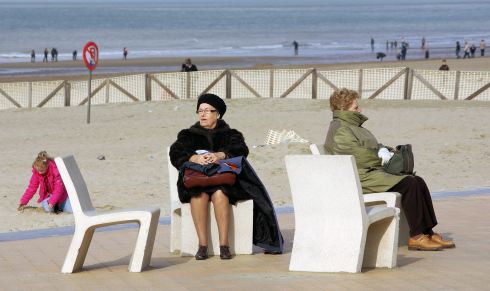This week’s quest to find out how I fit into the big scheme of things started last Saturday when an older ticket taker–a man say in his late 60s or 70s–gave me two tickets to see Horrible Bosses. After I paid just $20 for the two tickets, I looked at the pricing because I knew the theater raised its rates. Okay. It happened again. That older man who should have thought I was young decided that I was a senior citizen too and discounted my tickets. At that theater, a senior citizen is someone who is 55 or older. I am not yet 55, so you can imagine how I felt, especially because when I am not buying anything, I am usually perceived as younger, not older.
When I say it happened again, this was the second incident. Several years ago, I was given the senior discount at a Kohl’s Department Store. I think I was in my late 40s at the time and the girl at the cash register I would find out later was 28. And it is true that sometimes younger people think everyone older than them is old, but at Kohl’s, the age for the discount is 62…so it was really a stretch. When I questioned her, she said that it doesn’t matter, and explained that she was just being nice. Obviously, it does matter. It does to me. And she wasn’t being nice.
So now a few years later I am once again given the senior discount–just a freaking dollar off–for two tickets to the 7 o’clock showing. Ok, 7 PM is perhaps when older people go to the movies, and yeh–I don’t stay up as late as I used to–but my problem with the theater is not that I was perceived as being old, but that everyone who is truly and technically middle-aged is perceived to be a senior citizen. And further, the elderly do not deserved to be labeled either.
At the tail end of the boomer generation, I grew up thinking of senior citizens as age 65 and older. This was a perception set largely by the Social Security System, but whatever, it was something that was a rather reasonable standard. But today, the AARP membership is almost a rite of passage when someone turns 50, and all it is, is an organization for the retired. Of course, anyone who is 50 who can afford to retire is atypical. And clearly, anyone who can afford to retire at 50 does not need a senior discount so lumping all 50 plus people into the same category and giving marketers ideas does not do us any favors. Thanks AARP.
Unfortunately, some people involuntary retire at the age of 50. Some 50 year olds are forced into retirement because of ageism, something proliferated by a society that now sees anyone age 50 and up–instead of age 65 and up–as a senior citizen. But the logic is ridiculous. If everyone between the ages of 50 and 100 are lumped together, how do we define anyone younger than 50?
Another problem with defining people by age bracket is that people are doing different things at different ages. Some women do not start having children until they are in their forties, but there are also forty-year old grandmothers. Some people go back to school when they are middle-aged or older. Men can marry and start families even when they are elderly. Look at Larry King. And look at couples like Ashton Kutcher and Demi Moore, or Michael Douglas and Katherine Zita Jones. Now, what would the ticket taker do for couples with large age differences? Give the discount? Not give the discount? I’m sure it would put the ticket taker’s brain into a tailspin. He wields such power, doesn’t he? And he does, if we let him. Of course, yelling at the elderly ticket taker is not the solution, and it isn’t his fault. He is a victim too. The solution will only come after the society becomes more cognizant of the situation.
So how old is someone in their fifties anyway? Middle-aged? Senior Citizen? What ? How do we classify this segment? I checked two dictionaries. Both say middle age starts at 45 and ends at either 64 or 65. Clearly, the senior discount is not given to seniors only. Marketers have brilliantly realized that people in their 50s may not need a discount, but they respond to it. So companies create a new age parameter, lowering it every year, until it creeps through the early parts of middle age, and gradually, everyone accepts it.
What does the marketing ploy have to do with relationships? Ageism affects all of our relationships. And labelling theory in its wisdom suggests that calling people names results in stereotyping and expectations. When we ignore something because the person who uttered a statement is either too old or too young to be relevent, we are building unnecessary barriers. When we label everyone who is say between 50 and 100 years old as a senior, or someone who is on their way out and not relevant anymore, we reduce our opportunities to connect with a good number of people on the planet. How about not labelling anyone by their age?
In this culture where the word “retarded” is offensive, it makes no sense to use the “senior” label. Calling me or anyone a senior means that we are at the end of our days, that we are too poor to afford a full priced ticket, and that our voices do not count. They throw us dollar discounts and hope that we will bite, even if it is done in a condescending fashion.
I am ready to throw away my senior coupons, to call store owners on the practice, and to stop renewing my AARP membership. I am ready to live life as just an ordinary American citizen, and not a senior citizen. And I would really love to see a movement that helps to eradicate ageist practices like these. Anyone else on board?

